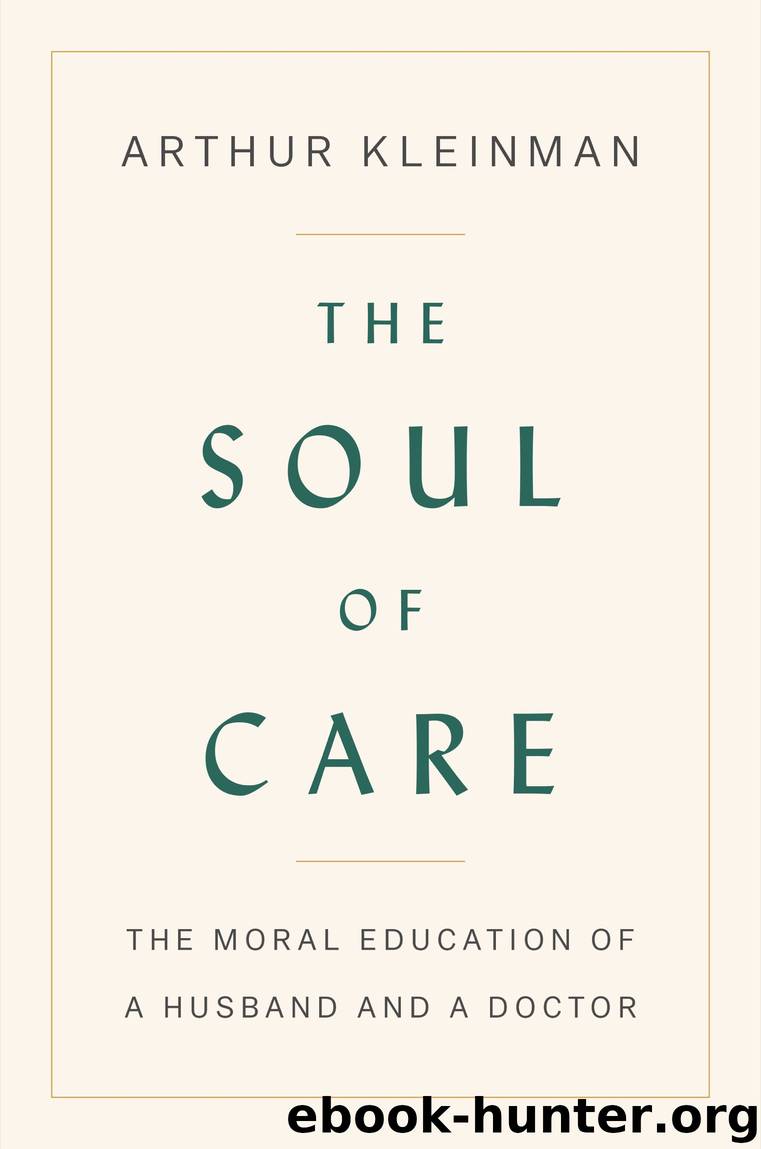The Soul of Care by Arthur Kleinman

Author:Arthur Kleinman
Language: eng
Format: epub
Publisher: Penguin Publishing Group
Published: 2019-09-16T16:00:00+00:00
* * *
—
Alzheimer’s disease rarely if ever follows any kind of conventional story arc. There is a beginning, to be sure, and an inevitable ending, but the middle—the long struggle during which care comes to the fore—is for most patients and families an ill-defined and often incomprehensible jumble. The various experts and authorities on Alzheimer’s tend to write about the disease as if it progresses neatly in clearly delineated stages, beginning with the early days of mild severity, the middle phase of moderate severity, and the final stage of the most serious disablement. I’m sure that kind of compartmentalization makes it easier to process and discuss the disease, but our lived experience of it was nothing at all like that. Our own illness narrative was in no way linear; it was illogical and unpredictable, and at times felt almost completely random. The story constantly looped back on itself, filled as it was with fits and starts; with lessons learned, then unlearned, then relearned again; with experiences of tragedy and victory that occurred over and over again, like a suite of unresolved themes and variations.
Indeed, life for us would come close to being unendurable over the course of ten years, but Joan’s symptoms did not, at first, progress beyond the visual problems. Slowly, over a period of several years, as the synapses in her occipital lobes continued to unravel, she became blind. She was in denial, to some extent, and she worked hard to cover up the extent of the loss and its disabling consequences. But Joan lost her vision too late in life; there was no time to learn to compensate. Her encroaching blindness meant that she could not continue her translation of, or read, The Thousand Character Classic, the historically important Chinese poem used to educate children in the Confucian tradition, which she had been working on devotedly for over a decade.
This blow to Joan’s scholarly life was compounded by her inability to use the computer, read our research materials, or correspond with family and friends. As time progressed, she could no longer watch films, go to the museums and art galleries that she loved, or appreciate the Chinese paintings we had accumulated over four decades and that had become such a regular source of pleasure for her. I watched helplessly as, bit by bit, she lost the deep core of values and sensibility that constituted her personhood, as all the things that made her who she was fell away.
Along with these ongoing losses, Joan also had to confront the erosion of her independence. At first, she found she could no longer trust what little vision remained to get her safely across the street on her own, which meant she couldn’t leave the house or the office unless she was accompanied. Later still, she couldn’t find her way around the house on her own. During a visit to our son’s home, she fell down a flight of stairs she hadn’t seen and broke her pelvis. After her long recovery from that frightening fall, she would always hold on to me, even in our own home.
Download
This site does not store any files on its server. We only index and link to content provided by other sites. Please contact the content providers to delete copyright contents if any and email us, we'll remove relevant links or contents immediately.
Periodization Training for Sports by Tudor Bompa(8251)
Why We Sleep: Unlocking the Power of Sleep and Dreams by Matthew Walker(6694)
Paper Towns by Green John(5175)
The Immortal Life of Henrietta Lacks by Rebecca Skloot(4571)
The Sports Rules Book by Human Kinetics(4378)
Dynamic Alignment Through Imagery by Eric Franklin(4206)
ACSM's Complete Guide to Fitness & Health by ACSM(4049)
Kaplan MCAT Organic Chemistry Review: Created for MCAT 2015 (Kaplan Test Prep) by Kaplan(3999)
Introduction to Kinesiology by Shirl J. Hoffman(3765)
Livewired by David Eagleman(3762)
The Death of the Heart by Elizabeth Bowen(3605)
The River of Consciousness by Oliver Sacks(3598)
Alchemy and Alchemists by C. J. S. Thompson(3510)
Bad Pharma by Ben Goldacre(3420)
Descartes' Error by Antonio Damasio(3270)
The Emperor of All Maladies: A Biography of Cancer by Siddhartha Mukherjee(3142)
The Gene: An Intimate History by Siddhartha Mukherjee(3091)
The Fate of Rome: Climate, Disease, and the End of an Empire (The Princeton History of the Ancient World) by Kyle Harper(3055)
Kaplan MCAT Behavioral Sciences Review: Created for MCAT 2015 (Kaplan Test Prep) by Kaplan(2980)
